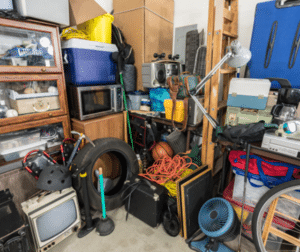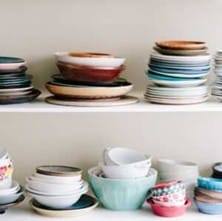The Cost of Clutter for Aging Adults

It is easy to see how things can pile up in the house and garage over the years. It is common to acquire things for a hobby, holiday, special collection, new clothing fashion, stuff for grandchildren, and more.
But when things come in and very little goes out, well – that leads to clutter. And clutter has both obvious and hidden impacts on our lives. These are the “costs of clutter”.
Do You Have Clutter?
According to Very Well Mind, clutter describes stuff maintained in a disorganized way. Essentially, clutter is piles of stuff people have and don’t necessarily use but keep anyway. Clutter in the home can be a hazard for trips and falls. Here are some questions to help figure out if you have clutter:
- Do you own things that you never use or no longer need? For example, your adult children’s stuff that is boxed up in the attic or a closet, clothes that are out of fashion or don’t fit, old sporting equipment, obsolete electronics, etc.
- Do you have a “junk drawer(s)” of things you never use but have not parted with?
- Have you ever bought new items to replace ones that are lost in the house?
- Do you have digital clutter in your email inbox, computer files, or photos?
- Does it ever cause you stress to have guests over because of the clutter or mess?
Reduce, Recycle, Reuse – Declutter
Clutter may build up because we do not want to thrash things when they have use and lots of good life left. It feels wasteful. In fact, so many people feel this way that a “reuse gifting economy” has developed. Check out this social movement and see if it is a fit for you.
One organization in the gift economy space is the Buy Nothing Project, founded in 2013. It is a global, social movement that connects people in their communities and enables the joy of “spending less, sharing more, and living generously“.
The mission of this organization is to cut waste going into landfills by facilitating the gifting of pre-owned items. People get the benefit of knowing that things they pass along are being put to good use by their neighbors. Find your local group on Facebook or via the Buy Nothing app. There is no cost to join your community. If a local group does not yet exist, you may want to be the person to start it up.
knowing that things they pass along are being put to good use by their neighbors. Find your local group on Facebook or via the Buy Nothing app. There is no cost to join your community. If a local group does not yet exist, you may want to be the person to start it up.
Another organization that focuses on sharing among members is called Freecycle. The Freecycle Network has been around even longer. It first launched in 2003. And they have over 9 million members around the world.
The group describes themselves as “a grassroots, nonprofit movement of people giving and getting stuff for free in their own towns. It’s all about reuse and keeping good stuff out of landfills.” There is no cost to join the network.
Ideas for Giving in Your Community
An important benefit of taking part in these communities is that you know someone in your local town or neighborhood will enjoy your gift and appreciate your generosity. You may even be surprised at what may be useful to others.
 An article in the New York Times highlights what Buy Nothing looks like in action in one neighborhood. From expected things like gifting a lamp, furniture, shoes, or a painting, the article goes on to mention people gifting food, loaning a cake pan and even passing along pickle brine, dryer lint, and water from a fish tank (for plant fertilizer).
An article in the New York Times highlights what Buy Nothing looks like in action in one neighborhood. From expected things like gifting a lamp, furniture, shoes, or a painting, the article goes on to mention people gifting food, loaning a cake pan and even passing along pickle brine, dryer lint, and water from a fish tank (for plant fertilizer).
Buy Nothing users have given and received items like puzzles, dishes, an enormous cardboard box (for a grandchild’s trunk or treat design), and a kayak. Buy Nothing requires members to live in your own town or community, so you know your things are staying local.
People who have used Freecycle have given and received things like picture frames, a dining room table, an electric juicer, and a bucket of used golf balls. So, you can see that there is a very wide selection of things that you can give away through these platforms. Of course, you will want to be cautious of anything you do online. Consider having curb pick up of items you give away or passing things along in a public place.
Benefits of Giving
Donating to any reputable organization or charity is fine, of course. The result of having less clutter will be achieved. The key difference is that groups like Buy Nothing and Freecycle also seek to build a sense of community, belonging, and connectedness.
In addition, the community gifting groups may help you to pass along things that charities may not be willing or able to take such as larger pieces of furniture. And if you are decluttering things with some sentimental connection, it can certainly help to know that its new owner will cherish it as you did…and pass it along again, when the time comes.
Many Costs of Clutter
Why should you consider decluttering? Notably, the costs of living in a cluttered home as we age may include time wasted, financial costs of buying things you already have, and heightened stress levels. Several research studies have shown that clutter can adversely affect a person’s health. As this WebMD article points out, mess equals stress.
Are there any places in their home that you’d consider to be cluttered? Do your things have a designated place? Do you touch things — like your mail — only once? Consider the costs of clutter and the benefits of decluttering, then take one step toward change today that can lead to more steps in the future.
Get Started Today
If you are a Friends Life Care member with questions about ways to declutter, contact your Care Coordinator. They can connect you with Concierge Services that are included as a benefit of membership. The Concierge Service includes referrals to decluttering, downsizing, and similar offerings.
If you are not yet a member, contact a Plan Counselor today to ask about joining. Friends Life Care is a nonprofit organization founded on and grounded in Quaker values. For some 40 years, Friends Life Care has had a mission to help older adults – especially members – successful age in the place they call home.
Leave a Comment
